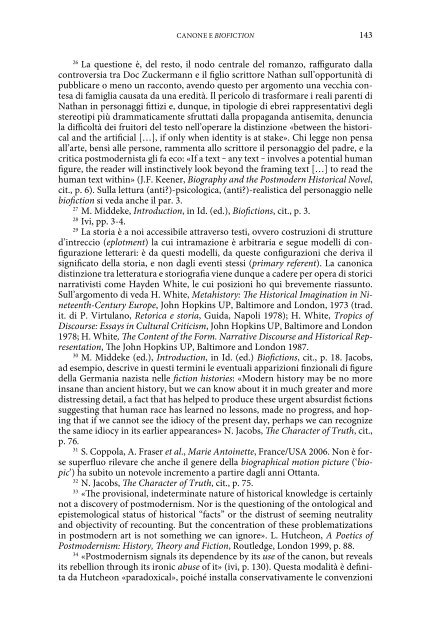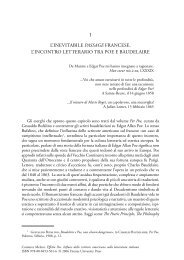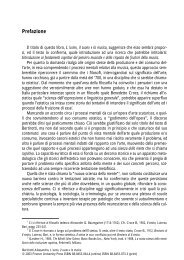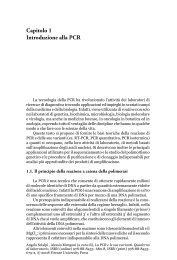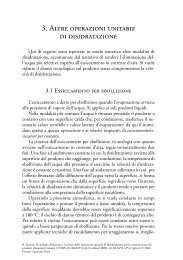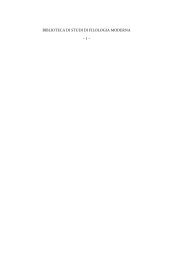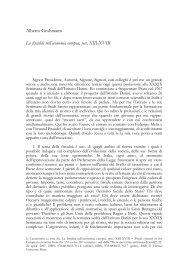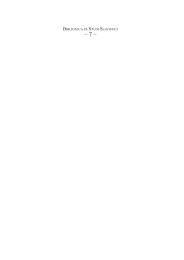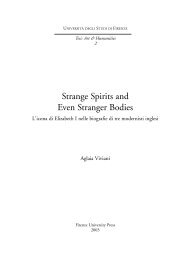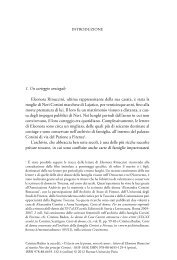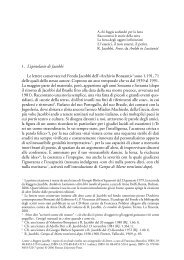biblioteca di studi di filologia moderna – 10 - Firenze University Press
biblioteca di studi di filologia moderna – 10 - Firenze University Press
biblioteca di studi di filologia moderna – 10 - Firenze University Press
You also want an ePaper? Increase the reach of your titles
YUMPU automatically turns print PDFs into web optimized ePapers that Google loves.
canone e BIOFICTION 143<br />
26 la questione è, del resto, il nodo centrale del romanzo, raffigurato dalla<br />
controversia tra doc Zuckermann e il figlio scrittore nathan sull’opportunità <strong>di</strong><br />
pubblicare o meno un racconto, avendo questo per argomento una vecchia contesa<br />
<strong>di</strong> famiglia causata da una ere<strong>di</strong>tà. il pericolo <strong>di</strong> trasformare i reali parenti <strong>di</strong><br />
nathan in personaggi fittizi e, dunque, in tipologie <strong>di</strong> ebrei rappresentativi degli<br />
stereotipi più drammaticamente sfruttati dalla propaganda antisemita, denuncia<br />
la <strong>di</strong>fficoltà dei fruitori del testo nell’operare la <strong>di</strong>stinzione «between the historical<br />
and the artificial […], if only when identity is at stake». chi legge non pensa<br />
all’arte, bensì alle persone, rammenta allo scrittore il personaggio del padre, e la<br />
critica postmodernista gli fa eco: «if a text ‒ any text ‒ involves a potential human<br />
figure, the reader will instinctively look beyond the framing text […] to read the<br />
human text within» (J.f. Keener, Biography and the Postmodern Historical Novel,<br />
cit., p. 6). sulla lettura (anti?)-psicologica, (anti?)-realistica del personaggio nelle<br />
biofiction si veda anche il par. 3.<br />
27 m. middeke, Introduction, in id. (ed.), Biofictions, cit., p. 3.<br />
28 ivi, pp. 3-4.<br />
29 la storia è a noi accessibile attraverso testi, ovvero costruzioni <strong>di</strong> strutture<br />
d’intreccio (eplotment) la cui intramazione è arbitraria e segue modelli <strong>di</strong> configurazione<br />
letterari: è da questi modelli, da queste configurazioni che deriva il<br />
significato della storia, e non dagli eventi stessi (primary referent). la canonica<br />
<strong>di</strong>stinzione tra letteratura e storiografia viene dunque a cadere per opera <strong>di</strong> storici<br />
narrativisti come Hayden White, le cui posizioni ho qui brevemente riassunto.<br />
sull’argomento <strong>di</strong> veda H. White, Metahistory: The Historical Imagination in Nineteenth-Century<br />
Europe, John Hopkins uP, baltimore and london, 1973 (trad.<br />
it. <strong>di</strong> P. Virtulano, Retorica e storia, guida, napoli 1978); H. White, Tropics of<br />
Discourse: Essays in Cultural Criticism, John Hopkins uP, baltimore and london<br />
1978; H. White, The Content of the Form. Narrative Discourse and Historical Representation,<br />
The John Hopkins uP, baltimore and london 1987.<br />
30 m. middeke (ed.), Introduction, in id. (ed.) Biofictions, cit., p. 18. Jacobs,<br />
ad esempio, descrive in questi termini le eventuali apparizioni finzionali <strong>di</strong> figure<br />
della germania nazista nelle fiction histories: «modern history may be no more<br />
insane than ancient history, but we can know about it in much greater and more<br />
<strong>di</strong>stressing detail, a fact that has helped to produce these urgent absur<strong>di</strong>st fictions<br />
suggesting that human race has learned no lessons, made no progress, and hoping<br />
that if we cannot see the i<strong>di</strong>ocy of the present day, perhaps we can recognize<br />
the same i<strong>di</strong>ocy in its earlier appearances» n. Jacobs, The Character of Truth, cit.,<br />
p. 76.<br />
31 s. coppola, a. fraser et al., Marie Antoinette, france/usa 2006. non è forse<br />
superfluo rilevare che anche il genere della biographical motion picture (‘biopic’)<br />
ha subito un notevole incremento a partire dagli anni ottanta.<br />
32 n. Jacobs, The Character of Truth, cit., p. 75.<br />
33 «The provisional, indeterminate nature of historical knowledge is certainly<br />
not a <strong>di</strong>scovery of postmodernism. nor is the questioning of the ontological and<br />
epistemological status of historical “facts” or the <strong>di</strong>strust of seeming neutrality<br />
and objectivity of recounting. but the concentration of these problematizations<br />
in postmodern art is not something we can ignore». l. Hutcheon, A Poetics of<br />
Postmodernism: History, Theory and Fiction, routledge, london 1999, p. 88.<br />
34 «Postmodernism signals its dependence by its use of the canon, but reveals<br />
its rebellion through its ironic abuse of it» (ivi, p. 130). Questa modalità è definita<br />
da Hutcheon «paradoxical», poiché installa conservativamente le convenzioni


